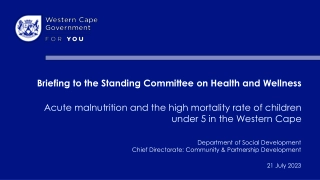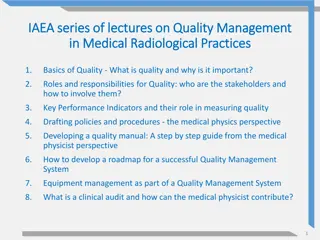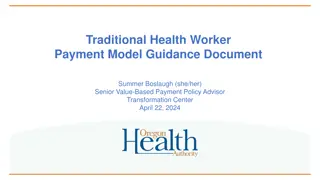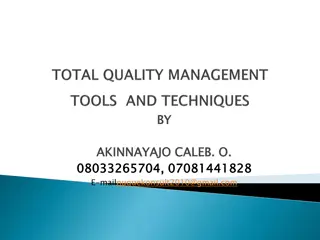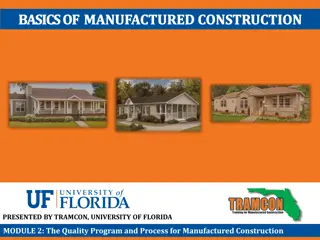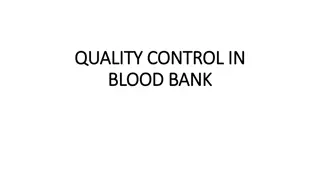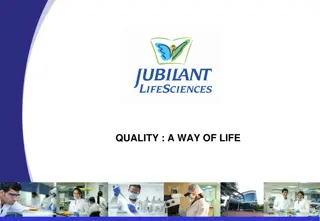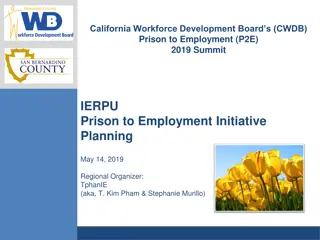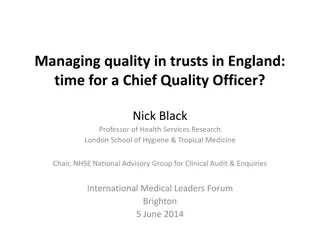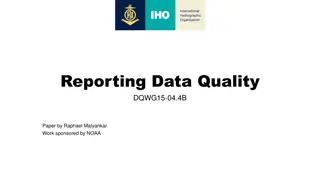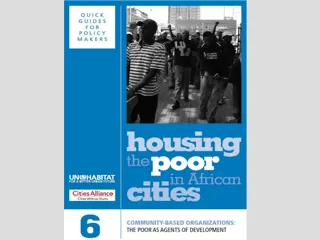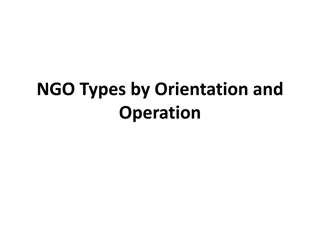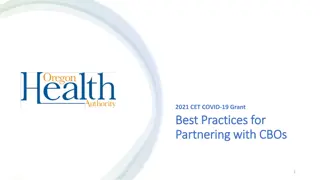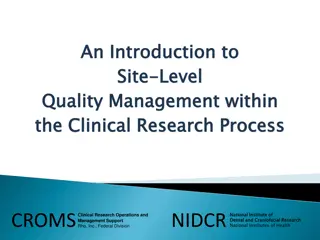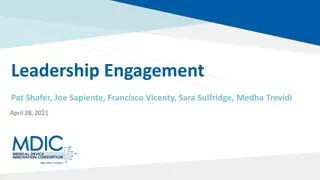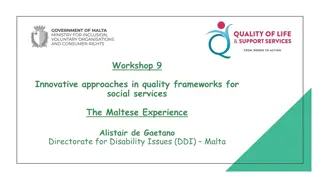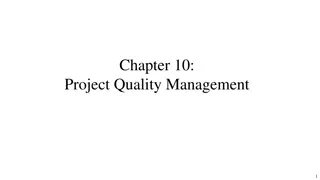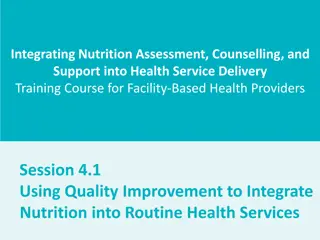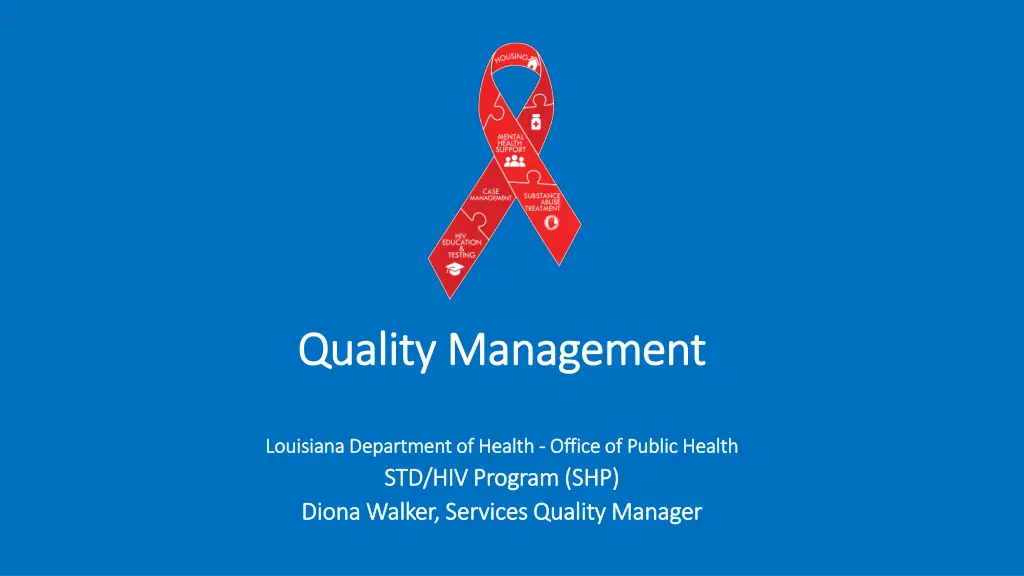
Quality Management in Louisiana Department of Health - Understanding QI Principles
Explore the concept of Quality Improvement (QI) in the Louisiana Department of Health's Office of Public Health STD/HIV Program, led by Services Quality Manager Diona Walker. Learn about QI principles, HRSA/HAB grant requirements, QM service standards, and the difference between Quality Improvement and Quality Assurance. Delve into the Policy Clarification Notice (PCN #15-02) and the essential role of Clinical Quality Management in providing consistent, high-quality HIV services under the RWHAP Expectations.
Download Presentation

Please find below an Image/Link to download the presentation.
The content on the website is provided AS IS for your information and personal use only. It may not be sold, licensed, or shared on other websites without obtaining consent from the author. If you encounter any issues during the download, it is possible that the publisher has removed the file from their server.
You are allowed to download the files provided on this website for personal or commercial use, subject to the condition that they are used lawfully. All files are the property of their respective owners.
The content on the website is provided AS IS for your information and personal use only. It may not be sold, licensed, or shared on other websites without obtaining consent from the author.
E N D
Presentation Transcript
Quality Management Quality Management Louisiana Department of Health Louisiana Department of Health - - Office of Public Health STD/HIV Program (SHP) STD/HIV Program (SHP) Diona Walker, Services Quality Manager Diona Walker, Services Quality Manager Office of Public Health
Understand basic definition of Quality Improvement Understand HRSA/HAB grant requirements (PCN #15-02) Outcomes Develop a common knowledge and framework of QI principles Understand QM Service Standards Share QM resources to support your agency QI efforts and meet requirements
is an organizational approach is a team based, problem solving approach uses a specified set of principles and methodologies IMPROVES CARE! What is Quality Improvement?
Quality Assurance Uses an identified set of standards/metrics to review performance and monitor processes i.e., utilization review, risk management, infection control, credentialing, accreditation and etc Quality Improvement Quality Improvement vs Quality Assurance Process of collecting and using valid data to: Understand the current level of quality Identify gaps between actual quality and expected quality for that setting Introduce changes in the care system (affecting inputs and processes of care) Frequently measuring the effect of those changes on health outcomes and system performance
Whatis PCN? PolicyClarificationNotice Quality Management Expectations for Ryan White Recipients (everything you need to know about PCN # 15-02) Reference documents: PCN#15-02ClinicalQuality ManagementPolicyClarificationNotice FAQs: Clinical Quality Management Policy Clarification Notice (Released12/01/2015)
RWHAP Parts A-D are required to establish a clinical quality management (CQM) program to ensure grant-funded services are consistent with the most recent Health and Human Services (HHS) guidelines for the treatment of HIV and related Opportunistic Infections (OIs) Implement strategies to improve the access to and quality of HIV services RWHAP Expectations (PCN #15-02) CQM is a major component that HRSA/HAB supports to optimize health outcomes and reduce HIV incidence Services Quality Manager s responsibility to work with sub recipients to implement, monitor and provide needed data on the CQM program Includes all services, including clinical and support services
Infrastructure Performance Measurement & Quality Improvement PCN #15-02: Components of an effective QM Program
Principle: Infrastructure enhances systematic implementation of improvement activities Infrastructure Infrastructure
Leadership Quality Committee PCN#15-02 Components of Quality Infrastructure Quality Plan Dedicated Staffing (and delineated roles)
Dedicated Resources Consumer Involvement Infrastructure Components cont d Stakeholder Involvement Evaluation
Principle: Actions are based on ACCURATE and MEASURABLE data Performance Measurement You can t improve what you can t measure
A sound QI Program reflects RWHAP funded services Local Epidemiology & Identified needs of PLWH Performance Measurement (PCN#15-02) Strongly encouraged to include HAB (HIV/AIDS Bureau) and (Health and Human Services) HHS measures that align with (National HIV/AIDS Strategy) NHAS
Identified process to regularly collect and analyze performance measurement data (should occur quarterly per PCN) - Kristina Larson Performance Measurement (PCN #15-02) ALL RWHAP- funded services categories must have at least one performance measure; highly utilized & highly prioritized service categories should identify two performance measures.
Types of Measures 1. Process Measures are the voice of the system. Process measures tell us whether parts or steps in the system are working as planned. Ex. Waiting time for appointments, no show rates, % of clients with self management goals in place, number of clients organized by acuity level in case management, length of time to complete LA HAP applications or LA HAP recertification rates. Performance Measurement 2. Outcome measures reflect the impact of our work on the care provided to our clients. Ex. Incidence of disease rates, mortality & morbidity rates, client/case manager satisfaction rates or cost of care delivered Outcome Measures are the voice of the customer.
Principle: Quality Improvement Success is achieved through meeting the needs of those we serve
Achieve continual improvement through small, incremental changes Quality Improvement
Quality Improvement
The goal is to: Quality Improvement (PCN #15-02) Improve patient/client access Patient/client care(services) Health outcomes & Patient/client satisfaction
2. Standard 2.1Agencies must participate in one QI project per year that addresses improvement in service quality and delivery Measure Quarterly reports submitted of the performance measures pertaining to the QI project Service Standards 2.2 Agency must have Quality Management plan updated biannually and approved by SHP Quality Management Staff, to include the required yearly QI project Measure Submission of Quality Management plan to the Services Quality Manager within first 30 days of the new contract
2.3Agency must conduct a Client Satisfaction Survey annually, survey must be approved by SHP Quality Management Staff, to obtain input from clients in the design and delivery of services Measure Documentation of content, use and confidentiality of the Client Satisfaction Survey Service Standards 2.4Agency must structure an ongoing Consumer Advisory Board (CAB) or the existence of an ongoing suggestion box for client input Measure Documentation of CAB meetings ,to include: meeting minutes, sign in sheets and meeting agenda Documentation of content, use and confidentiality of the suggestion box
Technical Assistance Request Form
Rough Draft of QM plan submitted within first 30 days of new contract Provide Diona Walker with agency QM contact person s (Name, Contact # and Email) Next Steps Quarterly Calls, duration: 1.5 hours Changes implemented September 1, 2018
Accountability QI quarterly conference calls Submission of data quarterly Greater emphasis on agency QM programs during site visits In 2018, you can expect
Quality Academy: Quality Improvement for Non-Clinical Services https://targethiv.org/library/quality-academy-quality-improvement-non- clinical-services Resources NQC Tutorials: www.nationalqualitycenter.org Series of QI learning modules Beginner to advanced
Diona Walker HIV Services Quality Manager Contact Information Office #: 504-568-7474 Email: Diona.Walker@la.gov

